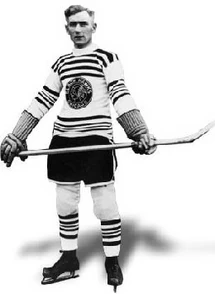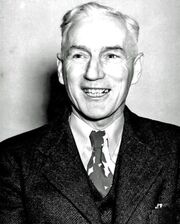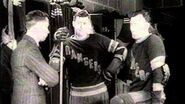| Dick Irvin | |

| |
| Position | Centre |
| Shot | Left |
| Height Weight |
5 ft 9 in (1.75 m) 162 lb (74 kg) |
| Teams | Chicago Blackhawks |
| Nationality | |
| Born | July 19, 1892, Hamilton, ON, CAN |
| Died | April 15, 1957 (aged 64), Montreal, QC, CAN |
| Pro Career | 1926 – 1929 |
| Hall of Fame, 1958 | |
James Dickinson "Dick" Irvin (Sr.) (July 19, 1892 – May 15, 1957) was a Canadian player and coach in the National Hockey League.
Playing Career[]
Born in Hamilton, Ontario, Irvin was one of the greatest players of his day, balancing a torrid slapshot and tough style with gentlemanly play. He played junior and senior amateur hockey in Winnipeg, Manitoba, winning the Allan Cup in 1915 with the Winnipeg Monarchs. He began his professional career in 1916 with the Portland Rosebuds of the Pacific Coast Hockey Association and was the fourth leading scoring rookie tallying 35 goals. Following a brief stint in the Canadian Army, he was reinstated as an amateur and played with the Winnipeg Ypres and the Regina Capitals. Irvin turned professional again in 1921 when the Regina Capitals turned pro in the Western Canada Hockey League. In 1926, at age 34, he entered the NHL, signed by the newly formed Chicago Black Hawks. Irvin was made the team's first captain, and had an impressive campaign, finishing second in the league in scoring. In their first season, the Black Hawks led all NHL teams in scoring, led by Irvin and Babe Dye. Irvin's second season turned to tragedy as he fractured his skull, which led to retirement after the 1928–29 season. The Hawks had finished with the worst record in the NHL in both of his last two seasons as a player.
Irvin was hired as head coach of the Black Hawks in 1930, and in his first season behind the bench led the team to 24 wins, 17 losses and 3 ties. Upon seeing his success as a coach, Toronto Maple Leafs owner Conn Smythe convinced Irvin to coach the Leafs. In his first season coaching the Leafs (the first in the brand-new Maple Leaf Gardens), he achieved immediate success by winning the Stanley Cup. However, Irvin was unable to deliver another Cup for the Leafs during his time as coach, despite taking them to the finals six more times.

Irvin as coach of the Canadiens
Smythe soon felt that Irvin had taken the Leafs as far as he could and Irvin resigned in 1940. Tommy Gorman went and picked him up and drove him to Montreal to become coach of the then-moribund Montreal Canadiens. It was there that Irvin found his greatest success, leading the Habs to three Cups in six finals. Helped by star players Elmer Lach, Doug Harvey, goalie Bill Durnan and a young Maurice Richard, the Canadiens were just beginning to blossom as an NHL dynasty.
Irvin, however, came under fire for encouraging "goon" tactics, especially after Montreal fans rioted in protest of Richard's suspension for the 1955 playoffs. Although they made it to the finals (losing to the Detroit Red Wings), internal pressure forced Irvin to step down.
He returned to the Black Hawks as head coach for the 1955–56 season, taking the reins of a moribund team that had only made the playoffs once in the past 10 years and finished last in the past two seasons. Irvin was unable to turn the team's fortunes around, and the Black Hawks again ended the year in last place, despite the emergence of Ed Litzenberger as a scoring star. Irvin was to coach the Black Hawks again in 1956–57, but he became so ill with bone cancer that he had to retire before the season began. He died a few months later at age 64.
A year later, Irvin was elected into the Hockey Hall of Fame. His coaching career included four Stanley Cups with 692 regular season wins, results surpassed only by Al Arbour and Scotty Bowman.
Awards and Achievements[]
- Allan Cup Championship (1915)
- Stanley Cup Championships (1932 - Toronto, 1944, 1946, and 1953 - Montreal)
- Lost in the finals a record 12 times as a Coach (1931 - Chicago, 1933-35-36-38-39-40 - Toronto, 1947-51-52-54-55 - Montreal)
- NHL First All-Star Team Coach (1944, 1945, & 1946)
- NHL Second All-Star Team Coach (1931, 1932, 1933, 1934, 1935, & 1941)
- Inducted into the Manitoba Sports Hall of Fame and Museum in 1983
- Selected to Manitoba's All-Century First All-Star Team and named Coach of the Century
- “Honoured Member” of the Manitoba Hockey Hall of Fame
Career Statistics[]
--- Regular Season --- ---- Playoffs ----
Season Team Lge GP G A Pts PIM GP G A Pts PIM
--------------------------------------------------------------------------------------
1922-23 Regina Capitals WCHL 25 9 4 13 12
1923-24 Regina Capitals WCHL 29 15 8 23 33
1924-25 Regina Capitals WCHL 28 13 5 18 38
1925-26 Portland Rosebuds WCHL 30 30 5 35 31
1926-27 Chicago Black Hawks NHL 44 18 18 36 34 2 2 0 2 4
1927-28 Chicago Black Hawks NHL 14 5 4 9 14 -- -- -- -- --
1928-29 Chicago Black Hawks NHL 36 6 1 7 30 -- -- -- -- --
--------------------------------------------------------------------------------------
NHL Totals 94 29 23 52 78 2 2 0 2 4
Coaching Record[]
| Team | Year | Regular Season | Post Season | ||||||
|---|---|---|---|---|---|---|---|---|---|
| G | W | L | T | OTL | Pts | Finish | Result | ||
| CHI | 1928–29 | 12 | 2 | 6 | 4 | - | (22) | 5th in American | Did Not Qualify |
| CHI | 1930–31 | 44 | 24 | 17 | 3 | - | 51 | 2nd in American | Lost in Stanley Cup Finals |
| TOR | 1931–32 | 43 | 23 | 15 | 5 | - | (53) | 2nd in Canadian | Won Stanley Cup |
| TOR | 1932–33 | 48 | 24 | 18 | 6 | - | 54 | 1st in Canadian | Lost in Stanley Cup Finals |
| TOR | 1933–34 | 48 | 26 | 13 | 9 | - | 61 | 1st in Canadian | Lost in Second Round |
| TOR | 1934–35 | 48 | 30 | 14 | 4 | - | 64 | 1st in Canadian | Lost in Stanley Cup Finals |
| TOR | 1935–36 | 48 | 23 | 19 | 6 | - | 52 | 2nd in Canadian | Lost in Stanley Cup Finals |
| TOR | 1936–37 | 48 | 22 | 21 | 5 | - | 49 | 3rd in Canadian | Lost in First Round |
| TOR | 1937–38 | 48 | 24 | 15 | 9 | - | 57 | 1st in Canadian | Lost in Stanley Cup Finals |
| TOR | 1938–39 | 48 | 19 | 20 | 9 | - | 47 | 3rd in NHL | Lost in Stanley Cup Finals |
| TOR | 1939–40 | 48 | 25 | 17 | 6 | - | 56 | 3rd in NHL | Lost in Stanley Cup Finals |
| MTL | 1940–41 | 48 | 16 | 26 | 6 | - | 38 | 6th in NHL | Lost in First Round |
| MTL | 1941–42 | 48 | 18 | 27 | 3 | - | 39 | 6th in NHL | Lost in First Round |
| MTL | 1942–43 | 50 | 19 | 19 | 12 | - | 50 | 4th in NHL | Lost in First Round |
| MTL | 1943–44 | 50 | 38 | 5 | 7 | - | 83 | 1st in NHL | Won Stanley Cup |
| MTL | 1944–45 | 50 | 38 | 8 | 4 | - | 80 | 1st in NHL | Lost in First Round |
| MTL | 1945–46 | 50 | 28 | 17 | 5 | - | 61 | 1st in NHL | Won Stanley Cup |
| MTL | 1946–47 | 60 | 34 | 16 | 10 | - | 78 | 1st in NHL | Lost in Stanley Cup Finals |
| MTL | 1947–48 | 60 | 20 | 29 | 11 | - | 51 | 5th in NHL | Did Not Qualify |
| MTL | 1948–49 | 60 | 28 | 23 | 9 | - | 65 | 3rd in NHL | Lost in First Round |
| MTL | 1949–50 | 70 | 29 | 22 | 19 | - | 77 | 2nd in NHL | Lost in First Round |
| MTL | 1950–51 | 70 | 25 | 30 | 15 | - | 65 | 3rd in NHL | Lost in Stanley Cup Finals |
| MTL | 1951–52 | 70 | 34 | 26 | 10 | - | 78 | 2nd in NHL | Lost in Stanley Cup Finals |
| MTL | 1952–53 | 70 | 28 | 23 | 19 | - | 75 | 2nd in NHL | Won Stanley Cup |
| MTL | 1953–54 | 70 | 35 | 24 | 11 | - | 81 | 2nd in NHL | Lost in Stanley Cup Finals |
| MTL | 1954–55 | 70 | 41 | 18 | 11 | - | 93 | 2nd in NHL | Lost in Stanley Cup Finals |
| CHI | 1955–56 | 70 | 19 | 39 | 12 | - | 50 | 6th in NHL | Did Not Qualify |
| Preceded by new creation |
Chicago Black Hawks captains 1926-29 |
Succeeded by L. S. Dutkowski |
| Preceded by Bill Tobin |
Head Coaches of the Chicago Blackhawks 1930–31 |
Succeeded by Bill Tobin |
| Preceded by Art Duncan |
Head Coaches of the Toronto Maple Leafs 1931-40 |
Succeeded by Hap Day |
| Preceded by Pit Lepine |
Head Coaches of the Montreal Canadiens 1940-55 |
Succeeded by Toe Blake |
| Preceded by Frank Eddolls |
Head Coaches of the Chicago Blackhawks 1955–56 |
Succeeded by Tommy Ivan |
Video[]
Arguably the most interesting NHL video of the 1930's. 1933 Stanley Cup Finals Game 4 highlights of all periods of play including the Cup winning goal by Bill Cook in overtime. Foster Hewitt provides the play-by-play and interviews Conn Smythe, Dick Irvin, Busher Jackson, Charlie Conacher, King Clancy and Red Horner in the dressing room during the first intermission. Horner played with a broken right hand and shows Hewitt his cast and how he was able to grip his stick. Hewitt then interviews the Rangers in their dressing room in the second intermission.
| This page uses content from Wikipedia. The original article was at Dick Irvin. The list of authors can be seen in the page history. As with Ice Hockey Wiki, the text of Wikipedia is available under the Creative Commons Attribution-Share Alike License 3.0 (Unported) (CC-BY-SA). |

